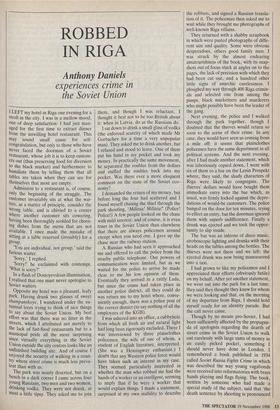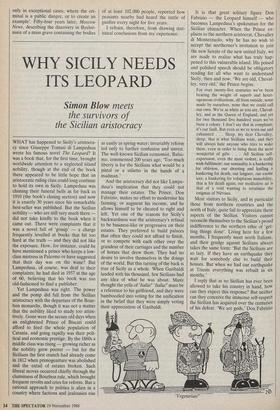ROBBED IN RIGA
Anthony Daniels experiences crime in the Soviet Union
I LEFT my hotel in Riga one evening for a stroll in the city. I was in a mellow mood, one of deep satisfaction: I had just man- aged for the first time to extract dinner from the unwilling hotel restaurant. This may sound small cause for self- Congratulation, but only to those who have never faced the doorman of a Soviet restaurant, whose job it is to keep custom- ers out (thus preserving food for diversion to the black market) and furthermore to humiliate them by telling them that all tables are taken when they can see for themselves that most are empty. Admission to a restaurant is, of course, only the beginning of the struggle. The customer invariably sits at what the wai- ters, as a matter of principle, consider the wrong table, and is chivied to a corner where another customer sits cowering, having been thoroughly scolded for choos- ing dishes from the menu that are not available. I once made the mistake of sitting at a table reserved (invisibly) for a group.
`You are individual, not group,' said the furious waiter.
`Sorry,' I replied. `Sorry!' he exclaimed with contempt. `What is sorry?' In a flash of Dostoyevskian illumination, I realised that one must never apologise to Soviet waiters.
Opposite my hotel was a pleasant, leafy park. Having drunk two glasses of sweet shampanskoye, I wandered under the au- tumnal trees trying to think of nice things to say about the Soviet Union. My best effort was that there was no litter in the streets, which I attributed not merely to the lack of fast-food restaurants but to a municipal pride all the more surprising since virtually everything in the Soviet Union outside the city centres looks like an unfinished building' site. And of course I enjoyed the security of walking in a coun- try where street crime is much less preva- lent than with us.
The park was nearly deserted, but on a bench in a dark corner I came across four young Russians, two men and two women, drinking vodka. They were not drunk, at most a little tipsy. They asked me to join
them, and though I was reluctant, I thought it best not to be too British about it: when in Latvia, do as the Russians do.
I sat down to drink a small glass of vodka (the enforced scarcity of which made Mr Gorbachev for a time a very unpopular man). They asked me to drink another, but I refused and stood to leave. One of them put his hand in my pocket and took my money. In practically the same movement, he separated the roubles from the dollars and stuffed the roubles back into my pocket. Was there ever a more eloquent comment on the state of the Soviet eco- nomy? I demanded the return of my money, but before long the four had scattered and I found myself chasing the thief through the park shouting, Militsia! Militsia!' (Police! Police!) A few people looked on the chase with mild interest: and of course, it is even truer in the Soviet Union than elsewhere that there are always policemen around except when you need one. I gave up the chase near the railway station.
A Russian who had seen it approached me and offered to call the police from the nearby public telephone. Our powers of communication were limited, but as we waited for the police to arrive he made clear to me his low opinion of them. Eventually they arrived in a rattly Lada, but since the crime had taken place in another police district, all they could do was return me to my hotel where, conve- niently enough, there was a police post of the correct district (to say nothing of all the employees of the KGB).
I was ushered into an office, a cubbyhole from which all fresh air and natural light had long been rigorously excluded. There I was interviewed by three plainclothes policemen, the wife of one of whom, a student of English literature, interpreted. (She was a Hemingway enthusiast.) I doubt that any Western police force would have taken such an interest in my case. They seemed particularly interested in whether the man who robbed me had the hands of a worker or an intelligent, seeming to imply that if he were a worker that would explain things. I made a statement, surprised at my own inability to describe
the robbers, and signed a Russian transla- tion of it. The policeman then asked me to wait while they brought me photographs of well-known Riga villains.
They returned with a shabby scrapbook in which were pasted photographs of diffe- rent size and quality. Some were obvious desperadoes, others good family men. I was struck by the almost endearing amateurishness of the book, with its snap- shots out of focus stuck at angles on to the pages, the lack of precision with which they had been cut out, and a hundred other little signs of anarchic carelessness. I ploughed my way through 400 Riga crimin- als and selected one from among the pimps, black marketeers and murderers who might possibly have been the leader of the gang.
Next evening, the police and I walked through the park together, though I doubted that the thieves would return so soon to the scene of their crime. In any case, they would have seen us coming from a mile off: it seems that plainclothes policemen have the same deportment in all political systems. And the next evening, after I had made another statement, which was laboriously copied down, I went with six of them to a bar on the Lenin Prospekt where, they said, the shady characters of Riga were likely to congregate. The thieves' dollars would have bought them immediate entry into the bar which, as usual, was firmly locked against the depre- dations of would-be customers. The police banged on the door for ten minutes, trying to effect an entry, but the doorman ignored them with superb indifference. Finally a drunk was ejected and we took the oppor- tunity to slip inside.
The bar was an inferno of disco music, stroboscopic lighting and drunks with their heads on the tables among the bottles. The thieves were not there and we left: the ejected drunk was now being manoeuvred into a taxi.
I had grown to like my policemen and I appreciated their efforts (obviously futile) on my behalf. After yet another statement, we went out into the park for a last time: they said they thought they knew for whom we were looking and that, on the morning of my departure from Riga, I should hold myself ready for an identity parade. But the call never came.
Though by no means pro-Soviet, I had been sufficiently affected by the propagan- da of apologists regarding the dearth of street crime in the Soviet Union to walk out carelessly with large sums of money in an easily picked pocket, something I should never have done in London. I remembered a book published in 1934 called Soviet Russia Fights Crime in which was described the way young vagabonds were received into reformatories with brass bands playing and flags flying. The book, written by someone who had made a special study of the subject, said that 'the death sentence by shooting is pronounced only in exceptional cases, where the cri- minal is a public danger, or to create an example'. Fifty-four years later, Moscow News, describing the discovery in Byelor- ussia of a mass grave containing the bodies of at least 102,000 people, reported how peasants nearby had heard the rattle of gunfire every night for five years.
I refrain, therefore, from drawing stat- istical conclusions from my experience.























































 Previous page
Previous page